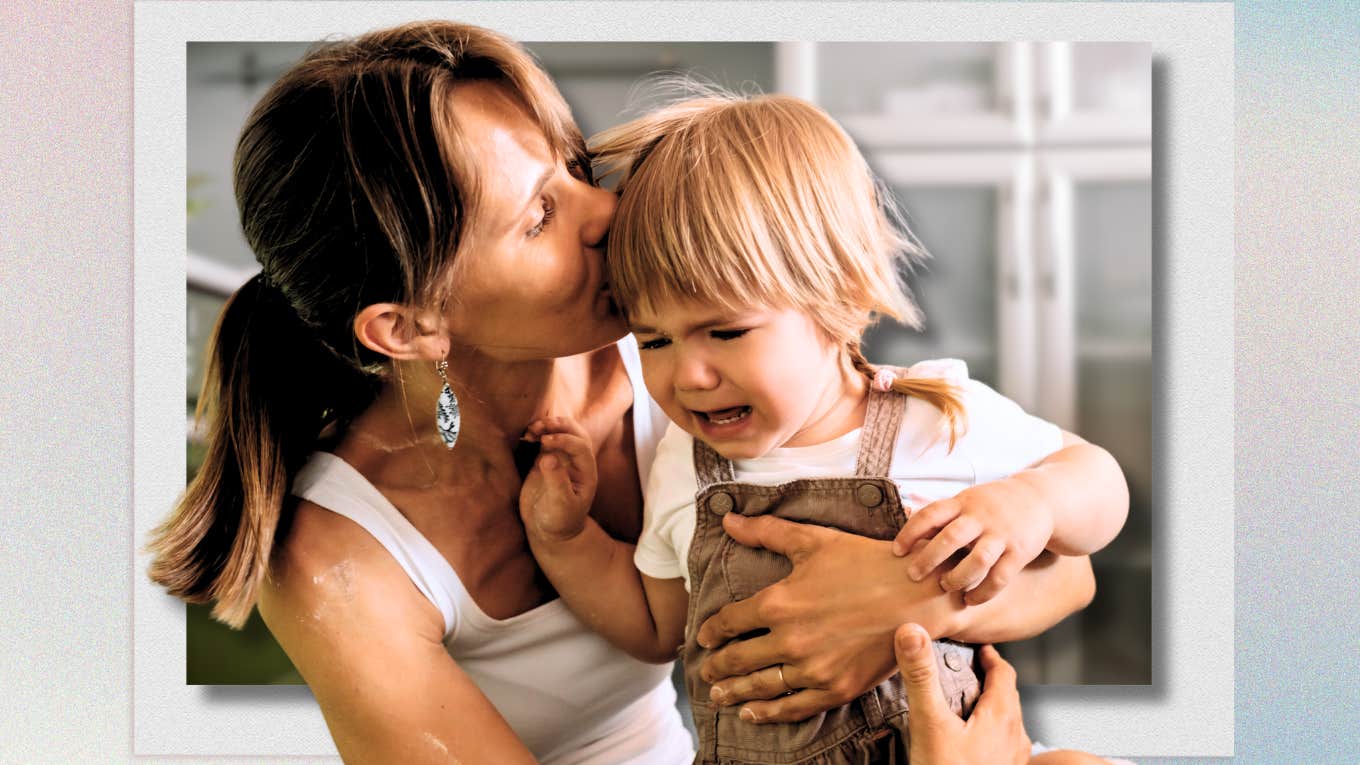8 Easy Ways To Be An Effective Parent During A Crisis
It doesn't take a natural disaster for a family to feel uprooted and go into crisis mode.
 dvulikaia | Canva
dvulikaia | Canva Parents around the world have been constantly adapting while learning to parent no matter what life throws at them. It's a difficult learning process. Thanks to late-stage capitalism, climate crisis, income disparity, ongoing wars and conflicts (and more), it often feels like there's no real end in sight, which can make you wonder how you and your family will get through this.
Can you hit the pause button on your binge-watching distraction and take a few deep breaths? As in any emergency, you must take a moment for yourself. Then you can figure out how to parent best during a crisis.
Here’s how to stay strong as a parent during a crisis.
1. Put your oxygen mask on first
I want to make sure you are kind to yourselves and take care of your health. As a parent, you always have to remember to put your oxygen masks on first, or you won’t be able to do your jobs as a parent, spouse, or employee. Remember: You already have skills and assets that will help you get through the challenges of this crisis and come out even stronger for the next.
2. Evaluate how you handle the uncertainty and anxiety of a crisis
Are you keeping all the balls up in the air while you make sure your school-aged children are logged on, doing their homework, and your little ones are getting fed, diapered, and put to sleep for their naps? And let’s not forget your work deadlines and sharing space with your spouse. Are you dealing with all the domestic chores, no outside help, and no easy dinners out?
Going out for fresh air, food shopping, and doing all those tasks while in the middle of a crisis is a trial.
Whatever the crisis, homelessness, natural disaster, pandemic, drone strikes, active shooters, or large-scale political clashes, there are a lot of details to add to an already overcrowded checklist, not to mention the anxiety and panic from forgetting one little item that could be key to protecting yourself and your family.
3. Know that the only way out is through
This principle of walking through fire and confronting your fears head-on has never been more relevant. You wish you could wake up in the morning and the crisis would have disappeared. But take one day at a time, and be kind to yourself.
Remember to draw upon the stored resilience and experience you already have. You've gotten through rough periods before. There's a light at the end of the tunnel. Take a few minutes at night to debrief and go over the events of the day. Is there something different you'd like to try tomorrow?
4. Be the best version of yourself as a parent and shout out to the kids
If you've been a parent for a while, then you've already been working on and fine-tuning those parenting skills. So much has changed in the last ten years, there's no doubt your life has been turned upside-down a few times already. This has also happened in the lives of your children.
Next time you're in a moment of disturbance or even simple change, remember that now is the time to practice active listening and validate your children’s feelings — including their fears. Help them articulate what they're feeling. Yes, there are lots of questions you don’t have answers to. Be patient, be honest, and help them feel safe.
5. Be truthful without over-sharing
One caveat is to be truthful, but make sure your answers are age-appropriate. Be mindful of over-sharing. Stay educated about the crisis and teach your children age-appropriate ways they can be in control and protect themselves. Keep in touch with friends who may have information about parenting resources.
 Prostock-studio via Shutterstock
Prostock-studio via Shutterstock
6. Be a positive role model and stay positive
Your children take their cues from mom and dad. Positivity is contagious. Teach your children how to fill their lives with positive activities and thoughts to crowd out the negative things. Research shows that unless you're occupied with positive thoughts, worrying is the brain’s default position. You can learn how to keep negative emotions and thoughts in check by amplifying positive emotions.
Great leaders know that a positive attitude can be contagious. You, as mom or dad, are the leader of your family. Parents who are smiling and upbeat and who practice a "half glass full" versus "half glass empty" outlook while expressing gratitude regularly can influence their children to adopt a positive mindset and perspective.
Positivity and gratitude also teach your kids coping skills and resilience. Take a few minutes and ask your children to list a few things they're grateful for in the morning and the evening. You can do it as a family at breakfast and dinner. They'll be surprised how many good things they still have in their lives, and so will you!
7. Schedule and maintain regular family meetings
This is a perfect time to hold family meetings and empower your children. Allow them to brainstorm and get involved in decisions about group activities in their free time when they aren’t engaged in learning and homework. Examples include where to walk, what to cook for dinner, family group projects, and more.
Think of these meetings and activities as team-building exercises. Family meetings aid in building self-esteem and teach children about ownership, responsibility, independence, compromise, and resolution of conflict.
Please remember to carve out time for fun and creative outlets! Maybe your kids want to dress up, put on their play, or wear funny socks. Or learn a new hobby. For younger children, how about creating fun activity boxes with toys and puzzles that require very little adult supervision?
 Nicoleta Ionescu via Shutterstock
Nicoleta Ionescu via Shutterstock
8. Set and respect boundaries
Mom and Dad, please remember to give each other physical space for your respective jobs and space and time to practice self-care. Avoid putting your phone on speaker and use your headsets for meetings. Mom may need time to call a good friend, go walk by herself, or put her feet up. Dad may want to do financial planning or watch a favorite show.
Please ask for help if you need it! You can assign tasks to your older children and reward them for helping you. This is a wonderful opportunity to teach them to be a team player and be responsible for tidying their rooms and toys. The same goes for cooking meals! Most children enjoy cooking and baking activities.
Lastly, take some time to think and plan for care for your children every day.
Ellen Kamaras is a life and organizational coach whose specialties include: relationship-coaching for singles, individuals seeking to reinvent themselves, empty-nesters looking for new purpose and fulfillment, and individuals who want to get “unstuck” but are afraid to take risks.

